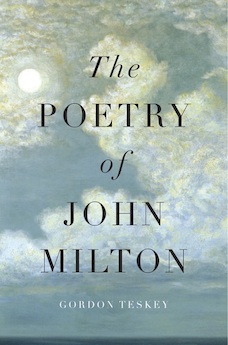Winner of the 2016 Christian Gauss Award
By Louis J. Kern
In this volume Teskey expands the argument in Delirious Milton: The Fate of the Poet in Modernity (2009) to include a critical overview of the entire poetic corpus extending from the twenty-six poems Milton wrote in Greek, Italian, and Latin (1624-29) to his last epic work, Samson Agonistes (1671). Teskey argues that Milton’s work differed from the traditional heroic poem in his “very modern reduction of ethics to decision” that led directly to existentialism.
Though Milton’s great epic works, Paradise Lost (1667,1674), Paradise Regained and Samson Agonistes (1671), have typically been considered Christian epics of theodicy, Teskey makes clear that Milton used biblical texts as a mythical exploration of human experience grounded in shamanistic insight. Deeply versed in classical drama and poetry, Milton aggressively appropriated these materials to deepen the narrative and mythic scope of the cosmic story of the Puritan God and Creation. Reacting against the heroic drama and romance of earlier epics from those of Homer and Virgil to Ariosto, Tasso, and Trissino as well as Chaucer and Spencer, Milton rejected their martial heroics, political struggles, and sentimental romanticism. Paradise Lost presents a starker and more cosmic struggle between God, Satan, and humankind for the future direction of history that is played out on the most expansive stage imaginable.
Teskey divides Milton’s career into three phases: (1) the early poems to A Masque Presented at Ludlow Castle (1634)—the transcendental phase, rejecting the world as irredeemably corrupt, forcing the devout soul to seek egress to the next, purer world; (2) the engagement phase, hoping to change the world through direct action and rational argument—the era of Milton’s chief prose works; and (3) the transcendental engagement phase—from Paradise Lost on—focused on the problem of history. In the last phase Milton adopts a stance outside history to view the human condition from before history and post sin and expulsion from Paradise.
In these last works Milton sees history not as defining what we are but rather what we have become through disobedience (understood here as failure to do what the best in us tells us is right in accordance with conscience and reason) and what we must overcome to reach fully human potential. Milton thus combines engagement with the historical moment that determines our knowledge, beliefs, and identity with the need to seek transcendence of the limitations imposed by the historical moment to regain our original freedom lost with the Fall.
For Milton, the central impellent force of history is temptation, imposing the necessity of human struggle to reclaim innate free will. Like James Joyce, he sees history as the nightmare from which we must awaken in order to be free. Teske’s reading of Milton thus affirms his modernity and contemporary relevance, an insight that is underscored by his discussion of Milton’s revolutionary militancy and publication, his campaign for divorce reform, his recognition of sexual equality, his conception of marriage in which sexual intercourse was not chiefly for procreation but rather an expression of love, and his heterodox theology that bordered on Unitarianism—asserting a monistic godhead and viewing Christ as a perfect man rather than an aspect of God.
Teskey’s work is not for the casual reader, but the diligent and attentive reader will be well rewarded here. His wide linguistic mastery, his intimate familiarity with classical literature, his philological and etymological insights, his masterful discussions of prosody, and his critical acumen make this a volume all serious students of Milton need to contemplate. Most importantly, he rescues Milton from the “dustbin of history” for a modern audience.
Louis J. Kern (ΦBK, Clark University,1965) is professor emeritus of history at Hofstra University. Hofstra University is home to the Omega of New York chapter of Phi Beta Kappa.




